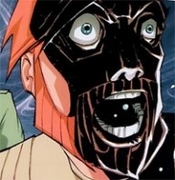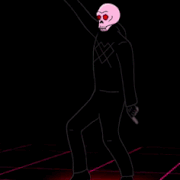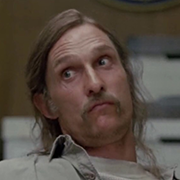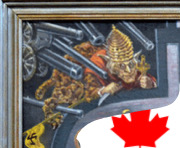|
twistedmentat posted:I was catching up on the WW2 channels videos and I watched the one on Artillery, and the Americans had timed how long every single type of shell they fired from every single type of gun so they could coordinate artillery strikes from multiple sources, so their barrages were not just 105s of whatever, but a whole mix of calibers that would probably play havoc with the germans because the explosions hitting you would be random. The point of the coordinated artillery barrage, also called time on target, was that research showed that caused the most amount of casualties in the first 6 seconds from the first round hitting, and after that the enemy troops had hit the dirt or found cover. So 36 rounds hitting within 6 seconds, where much more effective than for example 6 rounds every 10 seconds for 2 minutes.
|
|
|
|

|
| # ? May 11, 2024 11:45 |
|
This is very tangentially related but has there been good/accurate depictions of Pearl Harbor in cinema/TV? I know there's that movie from the 90s (ish?) but I heard it's terrible.
|
|
|
|
tora tora tora
|
|
|
|
HerpicleOmnicron5 posted:tora tora tora One of the wildest stunt accidents ever caught on camera. it it looked totally planned.
|
|
|
|
The Last Patrol shows the soldiers of Easy Company facing their deadliest foe of the war: hope. The war isn't over, the Germans are still fighting, men are still dying... but there's a sense that things are closer to the end than the beginning. Winning the Battle of the Bulge seemed to mark a turning point, and in America things are already largely feeling "normal" again, partly as evidenced in the letter to Buck last episode that was concerned about something as inconsequential as UCLA's place in the baseball standings that year. So now the problem becomes largely not so much winning the war, which is starting to feel all but assured, but surviving it. The men are based in Haguenau in France, right on the edge of France, with them on one side of the river and the German soldiers on the others. The war is ongoing, their is artillery shelling, sporadic fire being exchanged, and the men are exhausted and worn down but also feeling that dangerous feeling of hope. Missions are faced with increasing dread and despair, because every mission is a chance to die, and every day survived is another day closer to a seemingly imminent victory and return home. David Webster returns to Easy Company are a several month absence, expecting if not a hero's welcome then at least a welcome. He doesn't get it. Confused by the cold shoulder offered by the other men, the clear disdain on their faces and the attempts to fob him off into other squads, Webster simply can't figure it out. He trained with all of them at Toccoa, he jumped into France as part of the D-Day assault, he took part in Operation Market Garden. He isn't a replacement, he isn't some fresh behind the ears new recruit, he's a combat veteran who has been with the men since the beginning, so why are they treating him even worse than a stranger? Why are they acting like he's a traitor. The simple fact is that Webster did everything right, and that was wrong. He got injured, he went to hospital, he went through rehab, he returned to the replacement depot to wait to be reassigned. The other soldiers, when they finally deign to tell him, confirm that the problem is that he didn't go AWOL and return to fight far ahead of when he should have. Popeye did, Guarnere and Toye did, and in this episode Perconte makes a quick return and is given the hero's welcome that Webster absolutely did not get. It doesn't help that Webster seems to enjoy being the center of attention a bit too much, when the other soldiers realize he overheard the names of three soldiers being selected by a patrol over the river that night and insist he tell them, he makes a bit too much of getting to dole out that info, only for it to bite him on the rear end when the others throw him under the bus by telling Malarkey that Webster already told them who was getting screwed over. While the exhausted soldiers are dealing with the warring emotions of hope and fear over the war nearly being over, we see these represented in different ways with characters like Lieutenant Jones (played by Colin Hanks) who have only just graduated from Westpoint but need to be rushed into action so they can "benefit" from seeing combat before the war ends. Jones, a Lieutenant, finds himself in an unlikely quasi-friendship with Webster, a private, as they both find themselves the new kids at school in spite of Webster's history. Jones is quick to volunteer to take part in the planned patrol and quickly has that request declined by Winters. Webster though, seeing the benefit, offers to Jones the idea that the combat experience of the rest of the soldiers more than outweighs his lack, and recommends he offer to replace Malarkey who is clearly on the verge of collapse. Malarkey is on the verge of a battlefield commission to Lieutenant that Jones almost spoils the surprise on when he congratulates him for it before he is told, though Malarkey simply assumes the new guy mixed him and Lipton up, who got the battlefield commission last episode. Lipton, adorably, has pneumonia, and the fearsome Speirs fusses over him like a mom, which nicely establishes the rapport the two have built up since Foy. This backfires further on Webster when Sergeant Martin is hauled in to replace Malarkey instead, with Jones along only as an observer. It's both self-preservation as well as good sense that he suggests that Liebgott be removed from the patrol since the two of them both speak German and it is pointless and potentially dangerous to send both of them on the same mission. This follows Liebgott's angry muttering that Webster was trying to get out of the patrol himself when he downplayed his German language skills, which was probably him trying not to be boastful but had the opposite effect. The point is that Webster in his current situation can't win, the only thing he can do is get back into the action till the men forget they're mad at him and go back to treating him as one of their own. In another nod to fiction over reality, the real life Webster whose journals made up a significant amount of the source material for Ambrose's book did not actually cross the river in the raid, he was one of those stationed on the Allies side manning a machine gun to provide covering fire when the actual patrol returned. The patrol is a tremendous success, which you wouldn't know if you asked any of the soldiers. They cross the river, one of the boats capsizing in the water and putting them several men down, they take the building but Private Jackson is severely injured by his own grenade when he doesn't wait long enough after throwing it through a window to rush through the door. They capture three prisoners, but one is injured and has to be left on the riverbank (where he lies through to the next night moaning and screaming in pain, the Allies in no mood to show him the mercy of a sniper death while the Germans can't risk going to the exposed riverbank and getting shot trying to recover him), and Jackson dies in the cellar when they make their return. One of the soldiers, snapping to see his friend killed, is prepared to kill the German prisoners which kicks off a brawl, Jones managing to haul the soldier aside and somewhat get through to him by screaming in his face that if he kills the prisoners they'll have to go back the next night for more, which none of them wants. That's what Colonel Sink wants. Sink, for much of the series, has been a figure of much respect and admiration from the men. Some of it is a bit of asskissing, and Sink has largely just been a guy who shows up and tells the men he's proud of them and then insists they go back into action. But the respect has been there, until this episode where Nixon is open in his disdain and Winters doesn't hide his chagrin in discussing that a second patrol requested by Sink is because he's been bragging about the success of the first one to the other top brass and wants more to brag about. For the top brass, with the war seemingly nearing an end, there's a desire to improve their records even more than they already have by a series of successful missions. When Sink shows up and tells Winters he wants even more, Winters is polite and respectful and doesn't question the orders, but he's not happy. This leads to one of the few times we see Winters actively go against one of his superior officers. The first was when he called Sobel's bluff and requested a court martial over Sobel's bullshit charge, but this is far more serious. He lays out the plan for the mission to the soldiers, who listen in horror as he explains that the plan is EXACTLY the same, with the same troops, with the only difference being it will start an hour later, they'll have to infiltrate deeper, and the Germans will be ready for them. Once he establishes that they have the details correct, he informs them to have a good night's sleep and then report back the next morning that their patrol failed to secure prisoners. Everybody immediately grasps his meaning, they are to lie about following orders and simply do nothing, and the reason for Winters' decision is made clear enough: Sink ordered this last patrol fully knowing that Easy Company was due to be called off the line the very next day. They were THAT close to potentially dying one day away from being pulled back further from danger. Winters has just saved potentially 15 lives. https://www.youtube.com/watch?v=MOhkNaAy0Qo The episode ends with the hope a little stronger, with Webster accepted by the men again, with Jones already being pulled back to Battalion as he now has "combat experience", meaning Easy's 15th Lieutenant was there for maybe two days before going back to a non-combat role. Jones himself has found some level of acceptance from the men for being in the fight with them, Martin making a point of defending him when Cobb - drunk and forever struggling to find his own place/acceptance despite being as present or even moreso than Webster - snaps at him when called out on his drinking. Nixon hands Winters oak leaves, making a slight joke out of explaining that Sink didn't think his appearance was appropriate for his rank: Winters is now a Major. What would have been an unthinkable triumph in the Toccoa days now feels somewhat hollow for Winters, who barely notices Nixon's quick, seemingly sardonic but probably very genuine little salute. He's been through so much, and while he's seen the best of his men and he clearly feels very much like he belongs in the army, he's also gotten a taste of the bureaucracy, the bullshit, the administrative work and the networking that makes up far too much of the higher officer level of army life. The final text card to end the episode notes how Easy has come from America to England and then criss-crossed back and forth through Western Europe... but even now as the war seems to be drawing near an end, there is still one place they haven't been able to reach that they're about to get to: Germany. Operation Market Garden didn't get them there, but after Haguenau the Germans have fallen back as far as they can, and Easy is about to get a firsthand look at horrors that even everything they have faced up to this point will pale against. To further beat the dead horse that was Masters of the Air, the difference between the next episode and the almost "tick off that box on the checklist" sequence in Masters of the Air's final episode couldn't be more plain. Jerusalem fucked around with this message at 11:51 on Apr 2, 2024 |
|
|
|
kiminewt posted:This is very tangentially related but has there been good/accurate depictions of Pearl Harbor in cinema/TV? I know there's that movie from the 90s (ish?) but I heard it's terrible. Tora Tora Tora has already been mentioned. It sounds crazy when you hear the name "Roland Emmerich" involved but his movie about Midway is actually pretty damned good, and it also features a brief depiction of the Pearl Harbour attack. It isn't a perfect film by any stretch but it's much better than it has any right to be.
|
|
|
|
Yeah, I enjoyed Midway. They put a lot of stuff into the movie (Pearl Harbor, the Doolittle raid) but it all makes sense in trying to tell the story. On the whole it was decent.
|
|
|
|
One of the youtube flight guys just put this out flying in a P-51D https://www.youtube.com/watch?v=dX0OWXY2ook&t=12s
|
|
|
|
Well I watched Midway and I can't say I enjoyed it at all. Though I couldn't really pay attention past the first half. It's hard to believe it was made in 2019, feels like an early 00s film, . There's no pathos, the characters are trite, warfare is a milquetoast and not even slightly terrifying PG13 affair. Heck, the CGI is probably worse than Masters of the Air. What is even the point? Some choice moments: The line from Doolittle "people.. They're bombing people.." like they didn't just do the same thing a few hours ago. Midway gets attacked but they still got time to stop and calmly quip at each other. "This is for Pearl" says the bad rear end pilot as he single handedly wins the war. The Good Honourable Japanese stays with his ship as it goes down.
|
|
|
|
Midway is technically an independent film that Emmerich had to fundraise and finance himself because studios wouldn't shell out for it. I can forgive the dodgy CGI at points because I've seen much worse.
|
|
|
|
Midway is a very stupid movie but its depiction of the actual battle is not far off - if you can get over the very cringe one liners "This one's for Pearl" etc. That said if you are really interested in how Midway went down, especially from the Japanese perspective, then the book Shattered Sword by Jonathan Parshall and Anthony Tully is the definitive account of the battle. It's a long book, its very detailed, lots of graphs, etc, so it's a heavy read. But it is absolutely engaging especially if you have any interest in the Pacific War.
|
|
|
|
midway should’ve had a much narrower scope, it did too much and sucked because of it.
|
|
|
|
HerpicleOmnicron5 posted:midway should’ve had a much narrower scope, it did too much and sucked because of it.
|
|
|
|
Solaris 2.0 posted:Midway is a very stupid movie but its depiction of the actual battle is not far off - if you can get over the very cringe one liners "This one's for Pearl" etc. I read Shattered Sword a couple years ago and it’s a great read, but it goes into a super detailed account of everything so it’s more recommended if you are REALLY into it. Craig L Symunds book on Midway is very good and is a bit of an easier read, even if not quite as detailed.
|
|
|
|
Arc Hammer posted:Tora Tora Tora has already been mentioned. I actually hated the whole Pearl Harbor sequence in Midway. I thought they took bad ideas and executed them poorly. What they should have done was to cut from the little girl watching the explosions to the Enterprise coming in to port. That would have been a powerful take on it. Tora Tora Tora is the poo poo, watch that. Here's the stunt scene mentioned earlier, they're lucky nobody died but goddamn if it's not a great shot. https://www.youtube.com/watch?v=WS_da33g5ac
|
|
|
|
I'm embarrassed to say that until I saw the (terrible) movie Pearl Harbor I was woefully ignorant of the Tokyo Firebombing response from the US, and even seeing it portrayed as a heroic and amazing thing by valiant pilots in that terrible movie had me going,"...wait, isn't that a war crime?" Edit: Wait, actually looking it up further (like I said, I'm ignorant!) I see the one shown in that movie was the PR exercise that didn't actually achieve much of anything beyond showing it could be done, and the mass bombing that killed more people than the Hiroshima bomb came later. Jerusalem fucked around with this message at 01:56 on Apr 4, 2024 |
|
|
|
Jerusalem posted:I'm embarrassed to say that until I saw the (terrible) movie Pearl Harbor I was woefully ignorant of the Tokyo Firebombing response from the US, and even seeing it portrayed as a heroic and amazing thing by valiant plots in that terrible movie had me going,"...wait, isn't that a war crime?" Yep, the one in Pearl Harbor was the Doolittle Raid. https://en.wikipedia.org/wiki/Doolittle_Raid?wprov=sfla1
|
|
|
|
I remember even the kids books about ww2 that treated it like it was Star Wars or something else really black and white said "The Doolittle raid did nothing other than show the Japanese it could be done". Besides Tora Tora Tora, I'd recomend the WW2 channels minute by minute coverage of Pearl Harbour. https://www.youtube.com/watch?v=Joh2BXPsrXs&list=PLsIk0qF0R1j6ydMvoUBKj_WrnP4PtBlfk Speaking of that channel, I do like that in their War Against Humanity series they don't ignore or try to play down Allied War Crimes, but that being said, its really clear that for as bad as the allies were, the Axis were a thousand times worse. Like as a prof of mine in university put it, the allies war crimes were a side effect of the way they conducted the war, the Axis made war crimes the way they conducted the war. That's not 100% true for everything, but its true enough in summery.
|
|
|
|
i used to think the doolittle raid was so named because it did little, not because the guy who famously did little was called doolittle
|
|
|
|
The Doolittle Raid was the equivalent of Rocky opening up a cut on Drago.
|
|
|
|
Why We Fight, the penultimate episode of Band of Brothers, is a rough watch but I don't mean that in a bad way. It's an excellent, excellent episode of television that is also intensely emotionally draining. To hammer home a point I've repeated far too much, it makes the various problems that Masters of the Air had stand out all the more, because there was a roadmap to success laid out so clearly in 2001, and how that show managed to do everything Band of Brothers did but worse remains utterly baffling. It's an episode of two halves, and exceptionally well crafted. For much of the first half of the episode, there appears to have been a very deliberate choice to showcase the Allies very much as invaders. Having finally entered Germany, we still see events from the perspective of Easy Company and its soldiers, but they're shown in far from a heroic light. Soldiers burst into civilian homes and force them out so they can barrack up for the interim of their stay in the towns and villages they pass through, throwing out entire families, horrified mothers, outraged fathers, crying and shocked children etc. Looting is rampant, and at all levels: Speirs is shown hauling great piles of silverware to the post office (now being run by a stationed US soldier) to be shipped back to his parents, with a line indicating that he has been doing this multiple days in a row. Speirs' looting is apparently so well known that Perconte hesitates to lend him his own silver lighter (itself looted?) and has to timidly ask for it back when Speirs almost walks away with it. Speirs, it appears, is very much in the mindset of "to the victor go the spoils", apparently winding down somewhat from his "we're all dead" philosophy to "we won and it's time to think about the future", leading to uneasy moments where his dead-eyed stare suddenly cuts to wide smiles and an almost boyish enthusiasm that itself is unsettling to see. It's not JUST Speirs though. Nixon, adamant that he will only drink Vat 69 whisky, hunts around and takes it from wherever he can find it, including one night simply smashing open the window of a drug store thinking he might find some booze in there. The Military Police at least arrive soon after, though they simply salute a departing Nixon not grasping (or being smart enough not to question) an officer is responsible for the vandalism. Luz and Perconte sneak into a farmhouse to steal eggs from the chicken hutch, which leads to a deeply uncomfortable sequence where the farmer's daughter catches them and Luz won't stop trying to force her to talk, trying to bribe her with chocolate and getting a slapped face for his troubles. Thankfully it ends there, Luz informing Perconte and both of them laughing it off. Of course, the fact that Perconte stalked away from the scene in the first place indicated he was concerned Luz might take it further, and while it's all a laugh in the end for the two soldiers, for the farmgirl it is probably one in a series of traumatic events. Much like the last episode, we're also seeing continuing signs of the stress heaping down on the long term soldiers and the sense of urgency for the fresh arrivals. Perconte, usually so mild and friendly, snaps at eager new replacement Private O'Keefe when he enthusiastically asks when they're likely to "see action", pointing out that currently they're in paradise: they have a roof over their heads, hot meals every day, and they're not being constantly shelled, and after two years he is no hurry to "see action" again. Webster, upon passing a giant column of marching surrendered German soldiers, can't help but vent his rage at them for causing all of them to have to be there instead of at home, even as other soldiers try to calm him down. Nixon, increasingly drunk and feeling lost at sea, learns that his wife is divorcing him and taking everything including the dog (which she doesn't even like!), gets demoted, and appears to have lost all passion for life, especially following taking part in a parachute drop he didn't actually need to be in which saw the plane he just jumped out of destroyed with almost all the soldiers still inside. He can't think what to say to all those families about deaths that were essentially meaningless, killed so close to the war's end, feeling the guilt especially as he admits to Winters that he has somehow made it through the entire war from Normandy without once shooting his firearm. Winters, surprised, offers back that Nixon must simply tell the families the same thing they tell ALL the families, regardless of reality: their sons died as heroes. But it's hard to reconcile that when faced with the reality of finally meeting the German people they've been at war with for the last two years. The Germans are... normal. They're afraid and nervous but also seemingly willing to welcome and accept the "invaders" in their midst. Interview footage with the actual Easy soldiers from the start of the episode showcased the surprise they felt when they met Germans, including other German soldiers, and grasped that they were all simply doing their jobs and in another world they might have been friends. Nixon especially feels conflicted, when he walks into a large mansion to see if it will fit as a potential place to set up for soldiers to stay he finds a framed photo of a German Officer, which marks this as the home of the enemy... but when the lady of the house strides into the room and stares him down imperiously, he staggers out awkwardly feeling like the wrongdoer, the intruder. Part of it is seeing the dog with her, the connection with his own ex-wife and perhaps considering how fair it would be to lump the wife in with the soldier.. but a larger part I think is that he feels like the bad guy in this situation. And then that all changes. The discovery was inevitable, but what happens with Easy Company here appears purely down to chance. Winters, thinking that they MIGHT settle down in the town for the night, sends out patrols to make sure the surrounding area is safe. This leads to the discovery of something horrifying, Perconte racing back to find an officer, ANY officer, unable to fully articulate the horror of what his patrol discovered. Slowly, revealing more and more of the horror in parts, Winters joins the patrol where they find a barbed wire fence and emaciated figures standing hollow-eyed staring at them, the corpse of one caught between the wire after an apparent final desperate attempt to escape. It is a Concentration Camp, a name that belies the sheer monstrosity of it all: this is a place of extermination. Breaking the chains on the gates, they enter to a place of horror filled only with prisoners, because the soldiers have all fled, and it is clear that those soldiers fled because one of those "we could be friends" Germans from the town let them know the Allies had arrived. They didn't just leave though, first they tried to destroy as much of the "evidence" as they could. Another sanitized way of saying they killed people. Dozens. Scores. Possibly hundreds. They shot their prisoners till they ran out of bullets, they set fire to buildings with prisoners inside, and only when they ran out of time did they lock the place up and run, hoping that the surviving prisoners would die before the Allies found them. The prisoners weep and embrace the stunned soldiers, those with the strength carry the bodies of those who can no longer ever walk, almost skeletal figures who have been starved to the point they should be dead. Sheds are stacked full of prisoners who didn't even have the strength to move from their beds, or were too scared, blinking against the light when the doors are opened, fearing death, not grasping that the impossible has happened and they have been liberated. The chickens in the hutch that Luz and Perconte broke into were treated better than the humans stacked up in piles here in the camp. O'Keefe, who longed to see "action", sits huddled in the burned out remains of one shed, charred corpses all about, unable to comprehend the horror he has seen. One of the prisoners, through translations by a stunned Liebgott, explains what this place is: it is where the "undesirables" are held. Roma, people with disabilities, homosexuals, Jews. Liebgott, Jewish himself, can barely get the words out, and Winters can't make any sense of it. They all knew intellectually of course that Jews were targeted and horribly mistreated by the Nazis, but to see the reality is quite something else. And it isn't isolated, the prisoner informing them before finally breaking down entirely that the FEMALE camp is down near the next railway stop. This isn't one camp, it's multiple camps. As Sink will inform them later, multiple camps have been found at this point, including one discovered by the Soviets that dwarfs this one, and this one was already a horror beyond comprehension. The first reaction of course is to get the survivors fed, leading to the soldiers emptying the town's bakeries and warehouses of stored food, much to the outrage of the shopkeepers. Webster, enraged even more than he was earlier, pulls a gun on the baker and screams out accusations at him, so furious that he forgets he can speak German, demanding to know if he can really claim he didn't know about the camp when the stench of the place must have evident to all. He is talked down from killing the baker, but the horrors continue. In a necessity that must feel like a cruel joke, Winters is informed by a doctor brought in by Sink that they cannot let the prisoners leave the camp, and they have to stop feeding them. It's a necessity, to avoid refeeding syndrome that will kill them, the prisoner's feeding must be carefully regulated and monitored to get them back to something akin to normalcy. They also cannot risk letting the prisoners out and seeing them disappear into the countryside in an attempt to get away or to find missing family, because they need to document everything that has happened here. The prisoners are horrified when Liebgott, revolted in himself but knowing what he must do, tells them that they cannot leave and they cannot eat, feeling like freedom has been waved in their faces and then hauled away in a cruel joke. How much was known by "regular" Germans of course, who can say, but certainly SOMEBODY would have known. The German townspeople of course claim they had no idea, and that the Allies must be making this whole thing up. An infuriating excuse, one that disgustingly still comes up to this day. At least here there was a fix for that problem, as General Taylor declares martial law and orders all able-bodied people between the ages of 14 and 80 to take part in the "clean up" of the camp. Horrified, stunned German citizens haul bodies into stacks in the camps. Included among them is the imperious woman from the mansion who shamed Nixon earlier. Now he stares at her, not thrilling to the reversal as she recognizes him and clearly feels deep shame and humiliation. Instead he is just disturbed and confused by the inhumanity he has seen on display beyond anything he could imagine even after all the traumatic things he has seen over the last two years... and Nixon has been one of the "lucky" soldiers who never had to take active part in combat Earlier in the episode, a soldier - played by a baby-faced Tom Hardy whose first scene was having sex with a German woman when Speirs burst in looking for more silver - was reading an article about "why we fight", jokingly explaining to the amused soldiers that it turns out "The Germans are bad" which got a good laugh from everybody. The back half of the episode throws that joke aside to remind us of the horrifying, disgusting reality. The Allies didn't go to war with Germany because of that they were doing to Jewish people, to Roma, to all the other "undesirables", but if they hadn't then these horrors would have continued unabated until the "Final Solution" was completed, and the Jewish "problem" was ended. The episode is bookended by a single scene, each showing the inherent contradiction faced by the soldiers once they reached Germany. In the opening scene, we see Germans efficiently and resolutely going about cleaning up in the aftermath of shelling while musicians play music for them. Nixon identifies the music as Beethoven, who of course was German, one of the great composers who created some of the most beautiful art in history. In the closing scene, moments after identifying Beethoven, Nixon informs the men that Adolf Hitler - one of the worst people in history - is dead, having committed suicide. When the show first started, Joe Toye fantasized about murdering Hitler and getting a holiday named after him. Now, two years later, the soldiers greet the news of Hitler's death with a barely acknowledged grunt that he should have done it two years ago and saved everybody the trouble. That's all the comment his death deserves, a horrible little man whose insecurities and prejudices lead to untold death, destruction and misery. Nixon agrees he should have, but he didn't, and they leave the German townspeople to continue cleaning up the mess caused by Hitler's insanity. Masters of the Air's brief scene of Rosenberg finding the burned out remains of a camp in Poland feels so anemic by comparison to this episode, so much like a box checking exercise. This episode is incredible, but deeply difficult to watch. The title, Why We Fight, is a reminder that the horror of the Holocaust is something that must never be forgotten, something that cannot be turned into a joke. Remember this every time somebody tries to underplay how bad the Nazis were. Remember this every time you see somebody try to be "edgy" by doing a Hitler salute or show a swastika. Remember this every time a politician or a group in your country (any country) flirts with or tries to be cute about siding with groups of the "Alt-Right" (Nazis) or aims at some minority group as a scapegoat for society's problems. Because this is the end result, this is what happens when we don't fight against this type of disgusting, monstrous thinking. This is why we fight. Jerusalem fucked around with this message at 03:28 on Apr 7, 2024 |
|
|
|
It really says a lot that the main highlight of this thread is someone doing recaps of Band of Brothers. (Thanks and I'm looking forward to part 10)
|
|
|
|
FLIPADELPHIA posted:(Thanks and I'm looking forward to part 10)
|
|
|
|
Good read. Did O'Keefe sit on his bayonet?
|
|
|
|
I've already said a lot about it, but the scene in Masters of the Air feels like they set up a little concentration camp in an industrial park. A German rented a little spot on the side of the road to exterminate some jews in. Rosie was able to read what was on the wall, but it didn't have anywhere near the weight that BoB had.
|
|
|
|
Jerusalem posted:
This is why I get so upset when people start going on and on about Allied War Crimes, that there's often some kind of attempt to say "the allies were just as bad as the Axis" which, is far, far, Far from the truth you have to wonder what those people are actually thinking. In University, someone got their hands on some holcaust denial stuff and that was a big part of it, the holocaust was in part made up to justify the allied crimes against the German people, besides the whole Jewish conspiracy nonsense. And besides the clean wehrmacht myth, the myth of the clean german citizenry also must be destroyed. It wasn't put in newspapers and in newsreels, saying "today the glorious soldiers of the Reich murdered 4 entire villages of Jewish people in Southern Poland, keep rackin' up the killls boys!", but a lot of people knew, because they were involved in some way, and places like Dachau were fully known, but people who went there were criminals, communists, socialists, anarchists, and Catholics. People who were disrupting the ordered German society, so who cares? So maybe the majority of the population was ignorant of the death camps, concentration camps were definitly public knowlage. They shipped the materials to build them, knew people who were guards or otherwise involved with their running. Not to mention their neighbours who had been taken away and never seen again, they fully knew what the Nazis did to people they didn't like, their killing of people who disabilities raised huge concerns among the people, that they had to stop doing it openly, which is amazing when you think about it. The Nazis used terror and death to control the country, you had no idea who was snitching, so no one trusted anyone, so no one spoke out, otherwise you end up like Sophie Scholl and the other White Roses. I think at best it could of been an open secret? Though all Death Camps were outside of Germany, the one shown in band of brothers would of been something like Dachau, originally meant to just hold regular prisoners, but as the Holocaust spun up and Hitlers obsession with killing all the jews and how that would win him with war, they became places to put prisoners before they shipped them to Poland to be killed. That's really something not talked a lot about in popular ww2 stuff, Hitler and others honestly thought if they could kill all the Jews, the war would magically be won. Guess they thought Wodan would appear and smite the Allies and Soviets? People often ask why so many resources were put towards the holocaust and the murder of millions of innocents, well, that's why? gently caress Hitler, gently caress the Nazis, gently caress anyone who thinks the should be emulated today.
|
|
|
|
I still remember watching Schindler's List and seeing the scenes where the Jewish people's luggage is just being piled up in huge abandoned stacks as they go through their stuff to pull out the valuables, and it kind of hit me like a thunderclap of,"What the gently caress did they think was happening to the owners of this stuff if they were doing this with their belongings?"
|
|
|
|
Jerusalem posted:I still remember watching Schindler's List and seeing the scenes where the Jewish people's luggage is just being piled up in huge abandoned stacks as they go through their stuff to pull out the valuables, and it kind of hit me like a thunderclap of,"What the gently caress did they think was happening to the owners of this stuff if they were doing this with their belongings?" Before the war, Jewish people were actively being encouraged to emigrate from Germany - as long as they paid an exit tax which was basically 'all your money' but not at the time also 'and your life'. Main problem in leaving there was that other places (the UK and US for example) refused to accept Jewish immigrants - an opposition to immigration/asylum seekers not at all being something that also has resonance today, nosirree.
|
|
|
|
Doesn't why we fight also have a scene where german prisoners are executed as the americans drive by? I've always wondered about that one because in the truck they just kind of shrug it off. why we fight is an episode i think i've only ever watched once because as you say it's a really tough watch
|
|
|
|
Yep, I had actually forgotten because there is a LOT going on. I'm not sure which troops it is doing the execution, I don't think they were American but from memory they just haul a couple of soldiers out of their post and unceremoniously shoot them in the head, and the Americans are a little surprised but also too exhausted to really pay it much more mind than that. It certainly doesn't stand out in their memories like the Speirs story, which I think might have been part of the point of showing it in this episode?
|
|
|
|
Jerusalem posted:Yep, I had actually forgotten because there is a LOT going on. I'm not sure which troops it is doing the execution, I don't think they were American but from memory they just haul a couple of soldiers out of their post and unceremoniously shoot them in the head, and the Americans are a little surprised but also too exhausted to really pay it much more mind than that. It certainly doesn't stand out in their memories like the Speirs story, which I think might have been part of the point of showing it in this episode? yeah iirc it isn't americans that did it. the americans shrug it off, and then it immediately gets forgotten because goddamn they find the camp
|
|
|
|
Jerusalem posted:Yep, I had actually forgotten because there is a LOT going on. I'm not sure which troops it is doing the execution, I don't think they were American but from memory they just haul a couple of soldiers out of their post and unceremoniously shoot them in the head, and the Americans are a little surprised but also too exhausted to really pay it much more mind than that. It certainly doesn't stand out in their memories like the Speirs story, which I think might have been part of the point of showing it in this episode? I think they were French soldiers, who, understandably, really did not like the Germans. Also the Webster yelling at the marching prsioners is good in illustrating the advantage the western allies had over the Germans; you have horses! What were you thinking!? The Germans never had enough trucks and logistics vehicles so they still used horses to move stuff around, even in the early and mid war when the Reich was at its height of power.
|
|
|
|
Say hello to Ford and General loving Motors
|
|
|
|
Anyways I don't have any big write ups for BoB (but those are excellent keep doing them). I've also been watching and right now I'm on Crossroads. The desaturation gives BoB a look thst you don't really get with any other WW2 show or movie I've warched. From a visual standpoint it's so striking and some of the imagery in this episode in particular is haunting. I'm thinking about Winters's attack in the first half of the episode. It's such a sharp juxtaposition between and the quiet, almost peaceful morning, emphasized with the muted sound effects... and then Winters is suddenly atop a ridge and shooting into the SS company. I'm just imagining how that would look from the other side if out of nowhere a single guy appears and all turns to panic. Arc Hammer fucked around with this message at 19:08 on Apr 7, 2024 |
|
|
|
ilmucche posted:Doesn't why we fight also have a scene where german prisoners are executed as the americans drive by? I've always wondered about that one because in the truck they just kind of shrug it off. It was the French Army in the shot, which alongside the Canadians, extracted a pretty ferocious toll from the Germans after crossing the frontier, in part to ensure that no German resistance movement would spring up, and in part as revenge.     The Western Allies did not gently caress around after crossing the Rhine and had zero patience for any German resistance against them. The usual American move upon encountering any German urban area was to send up a jeep under a white flag with an officer, driver, and radioman to negotiate a surrender. If they were fired on, or the Germans did not surrender, the town would either be fired upon by all available guns of the divisional artillery, or - if they were free - levelled by medium or heavy bombers. The Americans were committed to not losing a single American life needlessly to give the Germans second chances. After this happened the first dozen times or so, word got around, so many large German towns and cities surrendered to 3 men in a jeep as the spring of 1945 went on. DJJIB-DJDCT fucked around with this message at 19:53 on Apr 7, 2024 |
|
|
|
They made it fairly clear in The Irishman where his officer gives him the nod to go deal the prisoners after they've dug their own graves.
|
|
|
|
Chubby Henparty posted:They made it fairly clear in The Irishman where his officer gives him the nod to go deal the prisoners after they've dug their own graves. I don't remember when Robert DeNiro does this.
|
|
|
|
In Jojo Rabbit, what city are they in? In the book its Vienna but are there any other cities both the US and USSR attacked at the same time? It's probably just German generic city because there's no landmarks or anything. But yea, the allies just wanted poo poo to be done, and didn't want to risk anymore lives than they had to, because they could do the math, with them in the west and the soviets in the east both on German soil, victory was assured. It was just up to the Germans, and the hope was they don't fight until the last. I mentioned jojo, which does a good job of showing the dysfunction of the end of nazi Germany, but downfall has some of the best stuff. The scene of the gauliter going around hanging people who didn't want to fight and the teenagers manning a gun. The former, this is what you spend your resources on? Warring on your own people above fighting the invaders. The latter, when they all have the slightly older teen shoot them, and he is just so devastated by it. He grew up in a bubble that told him that the perfect Aryan Superman will rule for a thousand years, how could slavs, who are only one level above Jewish people, defeat a divinely ordained people?
|
|
|
|
Cojawfee posted:I don't remember when Robert DeNiro does this. It's a flashback to Anzio. Which is not entirely accurate to the fighting there, but on par with the Americans' contacts with the Herman Goering Division in Sicily, Salerno, and (at times) the Anzio beachhead, and later on with the 16th Waffen SS Division in the MTO. Saving Private Ryan did a good job of showing the spontaneous or accidental killing of Germans immediately during combat which happened in places like Italy. Usually once Germans laid down their arms, they were safe - except for units with reputations like the HG and SS. As American troops in Northwest Europe were in combat longer, and as awareness of German war crimes like the Malmedy massacre spread, they were less than enthusiastic about taking members of the Waffen SS and Hitler Youth prisoner, which came to a head when they entered Germany proper. Other things contributed to this. For instance, the event dramatized in Masters of the Air, the lynching of allied airmen downed over Germany, prompted retaliation when American ground forces reached the cities where it was alleged to have happened. DJJIB-DJDCT fucked around with this message at 20:55 on Apr 7, 2024 |
|
|
|

|
| # ? May 11, 2024 11:45 |
|
twistedmentat posted:And besides the clean wehrmacht myth, the myth of the clean german citizenry also must be destroyed. Completely agreed. quote:The Nazis used terror and death to control the country, you had no idea who was snitching, so no one trusted anyone, so no one spoke out, otherwise you end up like Sophie Scholl and the other White Roses. This is just not true. The terror was reserved for the occupied countries, not Germany itself.
|
|
|




























